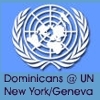

| BRIEFING - October 5, 2011 | To learn more about the Millenium Development Goals, click on the graphic Past Briefings: September 21, 2011 September 7, 2011 August 24, 2011 August 10, 2011 June 22, 2011 June 8, 2011 May 11, 2011 April 27, 2011 April 6, 2011 March 23, 2011 March 9, 2011 |
|
U.S. needs to ratify Comprehensive Test Ban Treaty
The Comprehensive Test Ban Treaty was first opened for signatures on Sept. 24, 1996. This treaty bans nuclear explosions for both civilian and military purposes. It also includes the creation of a global monitoring system that would detect any nuclear explosions, called the International Monitoring System (IMS). Out of 337 monitoring stations planned, the Arms Control Association reported that 264 have been set up. Despite the CTBT’s admirable goals, the treaty has been in limbo for 15 years due to a certain clause. There are 44 countries identified as “nuclear technology holders,” and every country identified as such will need to ratify the treaty before it enters into force. This gives every country an implicit veto power; if even one country refuses to ratify, the treaty cannot be enforced. For a multilateral treaty, or a treaty concerning multiple states, to be legitimate in the eyes of the United States, it needs to be ratified as well as signed. Ratification of international treaties for democracies usually consists of the approval of a government’s legislature through the country’s regular legislative process. For example, while the United States might sign a treaty, it will need the approval of the Senate with a two-thirds vote. President Bill Clinton signed the CTBT in 1996, but it has yet to be ratified by the U.S. Senate. Many experts seem to agree that if the United States and China ratify the treaty, this would serve as an incentive for the remaining states. In April 2009, President Obama said he would ask for Senate ratification of the treaty, but a timeline has not been given. Reports note that there has been an unofficial moratorium on nuclear testing in Washington since 1992. The U.S. Undersecretary for Arms Control took the floor on Sept. 24 to affirm the U.S. commitment to ratify this treaty; however, it remains unlikely that the president will rally two-thirds of the Senate to ratify this treaty any time soon with the 2012 presidential election so near. On Sept. 24, 2011, 15 years later, a conference was convened in order to facilitate the treaty’s entry into force. Although this treaty has been signed by 182 countries and ratified by 155, it will not take force until several key countries ratify it: China, the United States, Iran, Egypt, Indonesia, and Israel; while North Korea, India, and Pakistan have yet to sign. Repeated mentions of these nine countries were made at the conference, however, the conference ended without concrete actions by these countries to ratify the treaty. During the conference, Secretary-General Ban Ki-Moon made an appearance to urge for the ratification of the treaty. He even slipped in a light-hearted pun of his name, saying that as his name was Ban, he had a “clear, firm determination” to facilitate a nuclear testing ban. “The time for waiting has passed,” he stated. Ban Ki-Moon is right. While Obama has promised the ratification of the CTBT, nonpartisan cooperation is needed in order to ratify this treaty. While the CTBT’s International Monitoring System was only beginning when the treaty was first considered for ratification in 1996, 85 percent of the system is now in place. The IMS has proven to be very effective, and even picked up barely registering seismic activity in North Korea during the secretive nuclear testing in 2006. The United States has pledged $34 million for the 2011 IMS budget; therefore, it is surprising something that could only enhance global security is meeting with so much resistance in the U.S. Senate. Ellen Tauscher, the Under Secretary for Arms Control and International Security for the United States, added her remarks during the conference. “There are no set timeframes and we are going to be patient, but we will also have to be persistent… We do not expect that the path remaining to entry into force will be traveled quickly or easily. For our part, we will need the support of the Senate and the American people in order to move ahead, but move ahead we will, because we know that the CTBT will benefit the security of the United States and that of the world.” Let us hope that her words are followed with action.
|
Dominican Leadership Conference
Building relationships and collaborating in the mission of preaching the Gospel
29000 West Eleven Mile Road
Farmington Hills MI 48336
248-536-3234 Contact: Executive Director
 This week’s Briefing comes to you from our Dominican volunteer, Alexandra (Alex) Sajben.
This week’s Briefing comes to you from our Dominican volunteer, Alexandra (Alex) Sajben.